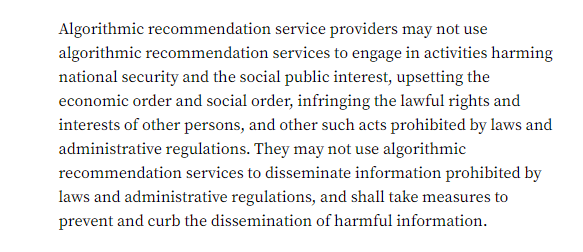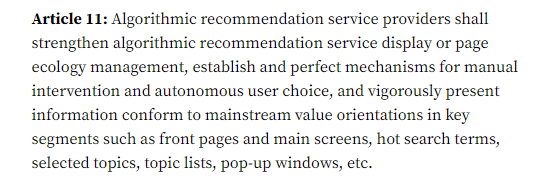It’s not often you read about the Chinese government introducing a new regulation that sounds reasonable, but it happens. The Internet Information Service Algorithmic Recommendation Management Provisions regulation came into effect on March 1, 2022. This act will try to regulate the algorithms e-retailers use to set prices for individual users. It also regulates how e-retailers filter content, control search results and recommend videos.
One of the main ways the new regulation prohibits price discrimination is to prohibit companies from using people’s characteristics–like age, gender, and location–to show them different prices for the same goods. It also forces e-commerce companies to notify users when they use algorithms to present them with a list of choices, and give them the option to opt-out.
Right now, this only impacts companies and citizens in China, but it may have far-reaching implications as China sets the stage for other countries to do the same. Government regulatory bodies in many countries tend to be slow at catching up with technological developments. That’s why common (but not always fair) practices like price discrimination are often overlooked or poorly regulated.
Yet, it looks like other countries, including the Netherlands, may be looking into applying similar regulations in the future.
What Is Price Discrimination?
Ever heard of big data? Satellites, websites, browsers, and devices are gathering data every second of the day. Much of that data involves you–your gender and age, what you watch and do, how you like to shop, what your interests and hobbies are, how much money you have, and where you live. Companies gather or pay for this type of data and use it to determine how much they should charge you.
Thanks to the magic of machine learning and web algorithms, e-retailers can just apply the parameters an algorithm has to look for, add a bit of math, and voila: you’re paying more just because you use a new iPhone. It’s also common practice for airlines, for example, to increase the price of airfare if you search for tickets multiple times, as it indicates an interest to buy.
While entirely unfair to the consumer, these practices are common and generally go unpunished in most countries, except (now) in China.
Outlining China’s New E-Retailer Rules

This new regulation was a joint effort by China’s Cyberspace Administration of China (CAC), the State Administration for Market Regulation (SAMR), and the State Tax Administration (STA). The first draft was released for public comment in 2021 and the amended draft was published in 2022. Here’s a translation of the full document if you’re interested, but I’ll quickly outline some of the main points:
-
-
-
-
- Relevant agencies will strictly monitor and control algorithms that provide personalized recommendations, product ranking, selections, and search filters. Any algorithm that tries to influence decision-making has to be vetted.
- Companies have to let users know what algorithms they use and how they implement them, and give users the option to opt out.
- Companies have to let users choose or delete user tags used for their personalized algorithmic recommendations if they don’t want to opt out entirely.
- Algorithmic recommendations have to abide by commercial and professional ethics and be open and transparent. Companies also have to implement algorithms in a way that “observe social morality and ethics”, although the bill doesn’t provide any specific definitions for these concepts.
- Algorithmic models may not encourage addiction or excessive consumption.
- Companies that use algorithmic recommendations have to strengthen their “information security management” and create databases to identify unlawful and harmful information. (While not defined here, China has set out definitions for what counts as “unlawful and harmful information” before. It includes a wide range of censored subjects.)
- Any company that uses algorithms to share news online has to get an internet news information service permit, standardize their practices, and may not share any news that wasn’t “published by work units in the state-determined scope”.
- Companies that use algorithms on their websites may not manipulate user accounts, create fake accounts or false comments, and may not shield information, or manipulate topics.
- Companies may not use algorithms to impose unreasonable restrictions on other service providers. (The bill did not specify what counts as “unreasonable”.)
-
-
-
How Is China Enforcing This New Regulation?
This is where the crux comes in, as China is threatening fines and even revoking business licenses for companies who don’t comply. Yet, accurately keeping track of constantly evolving algorithms across all the companies in a country as massive as China is certainly a daunting task. Likely, the government will rather fixate on larger companies and repeat offenders like Alibaba (who has been fined for anti-competition practices in the past) and try to make an example of them.
It looks like Chinese authorities won’t have a hard time implementing these new measures, though, as some companies have already started to comply in 2021. Self-regulation and self-censorship are normal in China, so this isn’t a large stretch. For example, big tech companies like ByteDance (which runs the popular short-video app Douyin) have started inserting five-second videos intermittently to urge users to take a break from their feeds, curated using various algorithms.
Since this is China we’re talking about, a concerning censorship element has been thrown in there for good measure. The following snippet prohibits companies from using algorithmic recommendations to spread “harmful information”:

It also includes a passage that dictates service providers have to tailor their algorithmic recommendations to conform to “mainstream value orientations”. While that can simply mean recommendations have to reflect popular demand, the wording here is a bit ambiguous. It also provides the CCP with the option to determine what counts as “mainstream value orientations”.

How Price Discrimination Is Handled Outside China

China has a history of taking strong stances against websites, big tech companies, and online commerce practices. That means these new regulations are consistent with China’s online regulation trajectory and likely unsurprising to Chinese companies. Things look very different in the West, though, where web regulation is starting to pick up but is nowhere near as robust.
Price discrimination is exploitative. The COVID-19 pandemic has only aggravated it as online shopping increased exponentially. Regulations did not follow suit, though. The EU has a rule against price discrimination in the sense that you can’t be discriminated against based on your location or nationality. However, I couldn’t find any evidence showing that a company has ever been reprimanded for violating that rule.
Right now, VPNs are the only way for most people to sidestep price discrimination. A VPN hides your network’s IP address, making it hard for websites and retailers to track you online. Yet, it doesn’t protect against every type of tracking. Retailers will still be able to see what device you use, and if you have an account, they’ll be able to use your purchase history as an indicator for their algorithms.
That said, VPNs provide an excellent way to prevent location-based discrimination and keep websites from profiling you based on your browsing history. CyberGhost VPN has 116 server locations across 91 countries, giving you the option to shop like a local from almost anywhere. You can also use price discrimination to your advantage and get better deals online. Like the old adage says–if you can’t beat them, join them.



Leave a comment